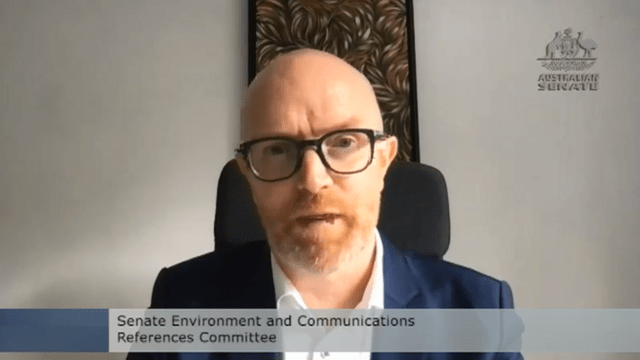In Facebook’s appearance before a committee on media diversity, representatives set out to downplay their role in Australian media. What they ended up doing was parrying questions about all kinds of topics.
On Monday morning, Facebook’s director of policy for Australia, New Zealand and the Pacific Islands Mia Garlick and vice president of police for the Asia-Pacific region Simon Milner appeared before the Senate environment and communications references committee into media diversity in Australia.
In their first public appearance since the Facebook news ban and the subsequent passing of the news media bargaining code passed, Garlick’s opening address pre-empted potential questions from the Committee, including fears that small publishers would be hurt or wouldn’t see any benefit from the code.
According to Facebook, the company has signed 6 deals with publishers in Australia since the Government proposed the news media bargaining code. They’re three year deals and worth tens of millions of dollars a year in aggregate, but Garlick declined to say exactly how much.
While the news media code was certainly discussed — including a heated moment between Facebook’s representatives and senators over whether the news ban was an attempt to bully the Parliament — Garlick and Milner also had to contend with a smorgasbord of other concerns.
South Australian Liberal Senator David Fawcett began asking about what Facebook was doing to expose Australians to diverse sets of views and news.
Labor’s Senator Kim Carr asked about how much they’re planning to do to support the Australian news industry.
Greens Senator Sarah Hanson-Young tried to get Facebook’s representatives to acknowledge that having public interest journalism on the platform is good for the platform. Greens Senator Mehreen Faruqi sought answers about a network of far right Facebook pages that made money off directing® Islamophobic hate towards politicians.
For all of these questions, Garlick and Milner alternated between casting Facebook as just a tiny minnow in a larger news ecosystem to a benevolent behemoth, happy to help out publishers.
But at times these contradictory frames clashed. At one point, Milner said that, no, the government’s news media bargaining code didn’t actually force them to pay for news — that was already something that they were planning on doing with their Facebook news product. But earlier, Garlick blamed the news media bargaining code framework for small publishers missing out on the benefits.
So which is it? Is Facebook being restricted by our limited regulation? Or are they freely choosing to help news publishers? It can’t be both.
Nowhere was this more obvious when Milner rehashed his argument that news isn’t that important to the Facebook platform. It makes up just 4 per cent of the feed, Milner repeated, as proof of its lowly status for Facebook.
Senator Carr jumped on that to ask why then is Facebook paying tens of millions of dollars a year for something that apparently isn’t that important to Australian users. Facebook’s representatives didn’t have a good answer.
